Grooved Aluminum Lean Pipes for Modular Systems
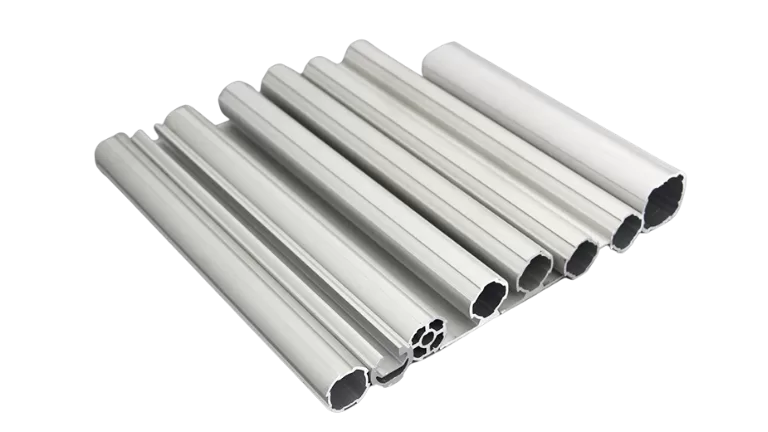
HTS-ALU is a Chinese manufacturer of lean pipes, equipped with a complete production line that encompasses mold design, extrusion forming, surface treatment, and machining.
- Extensive Mold Coverage: HTS-ALU offers a wide range of molds to meet customer needs, ensuring quick turnaround and production flexibility.
- Precision Aluminum Extrusion: Our advanced techniques ensure high precision and consistency in every lean pipe for optimal performance.
- High-Quality Surface Treatments: We provide superior surface treatments, including anodizing and powder coating, for enhanced durability and aesthetics.
- Custom Machining Services: Our tailored machining solutions meet specific requirements, delivering customized products with precision.
Grooved Aluminum Lean Pipes
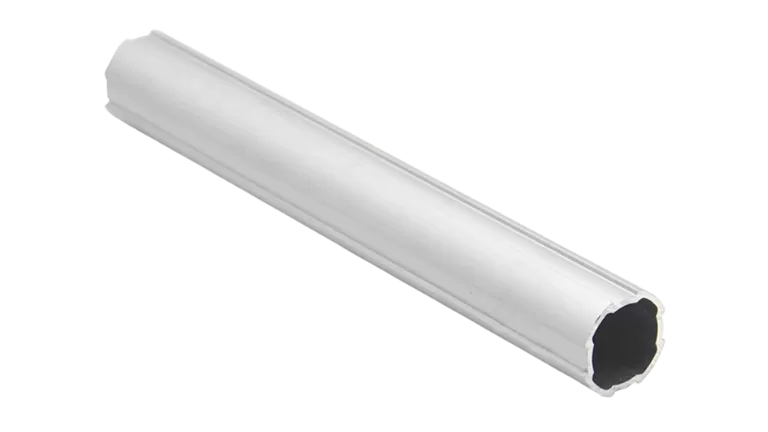
Grooved aluminum lean pipe is a specialized type of aluminum pipe featuring grooves along its surface, allowing for quick and easy connections, much like T-slot profiles. This lightweight aluminum alloy material is produced using the aluminum extrusion process. It has standard specifications of an outer diameter of 28mm and a wall thickness ranging from 0.8mm to 2.0mm. The design allows for rapid assembly into various structures and, when used with specialized connectors and accessories, is commonly utilized to create material carts, shelves, workstations, and more.
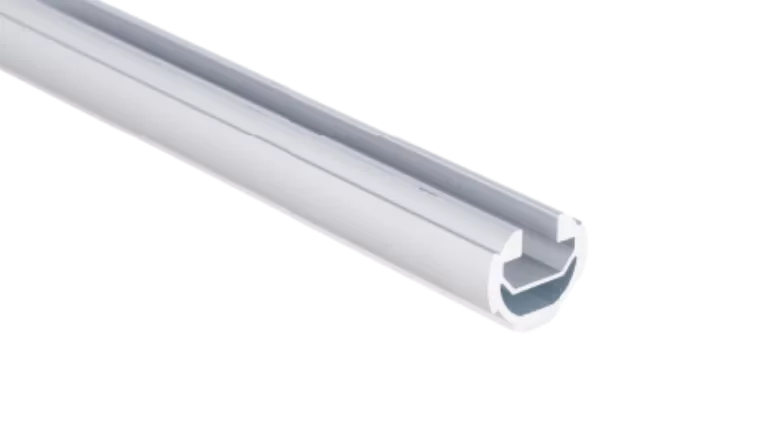
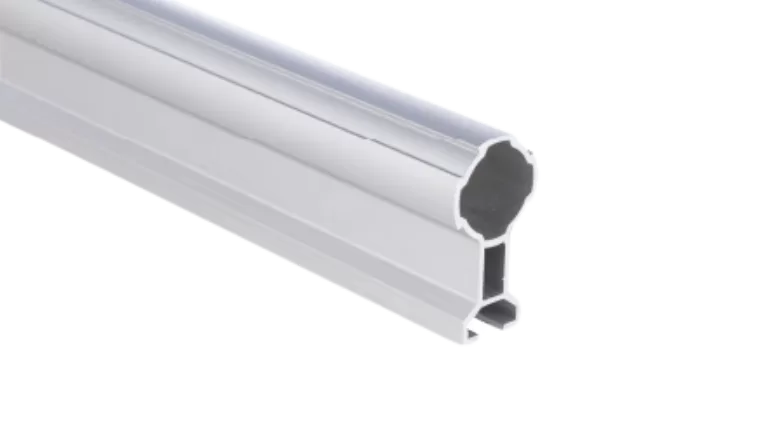
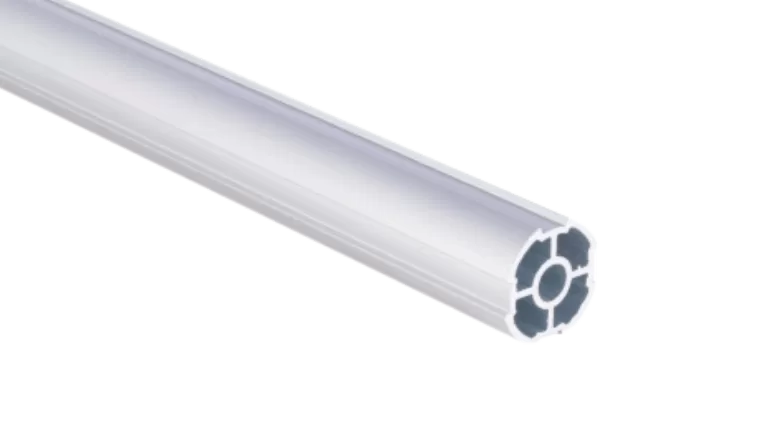
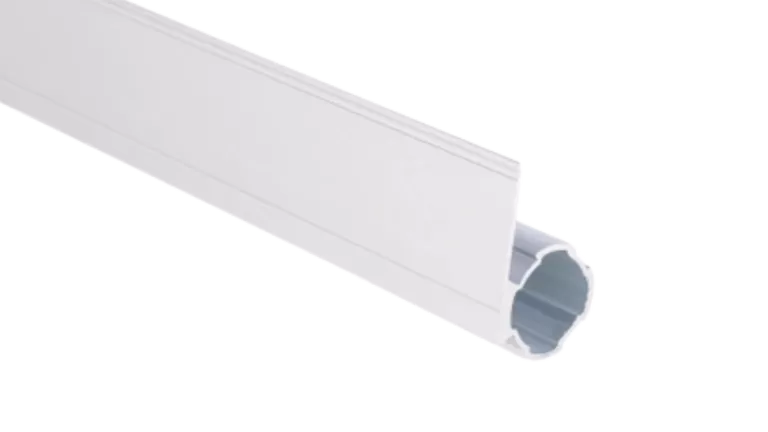
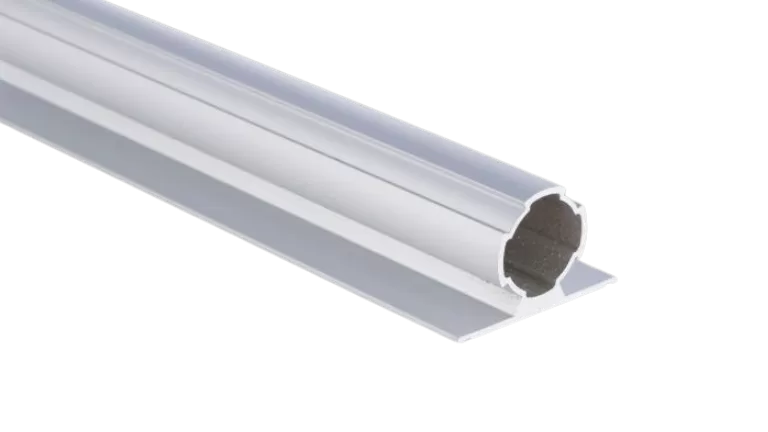
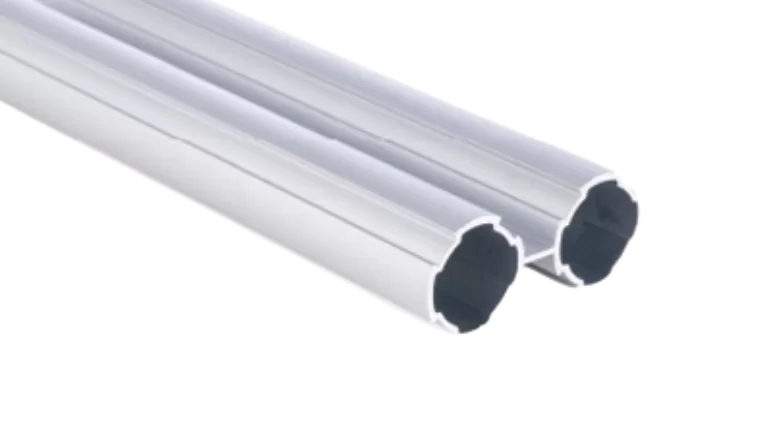
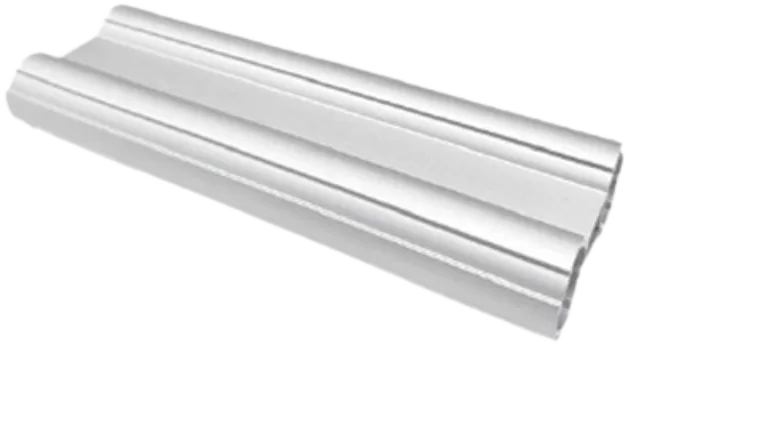
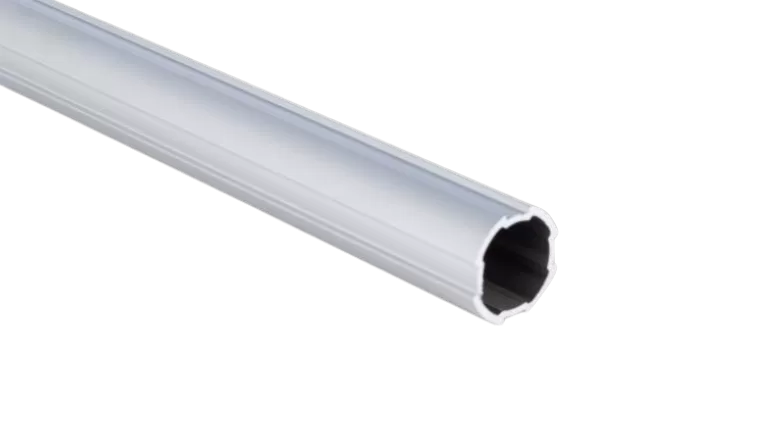
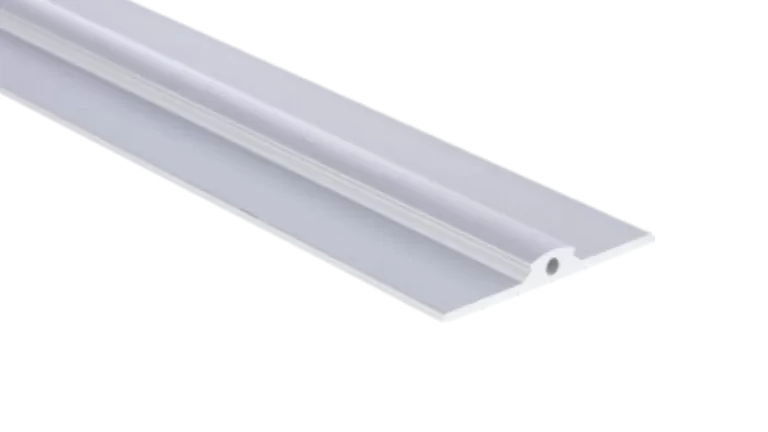
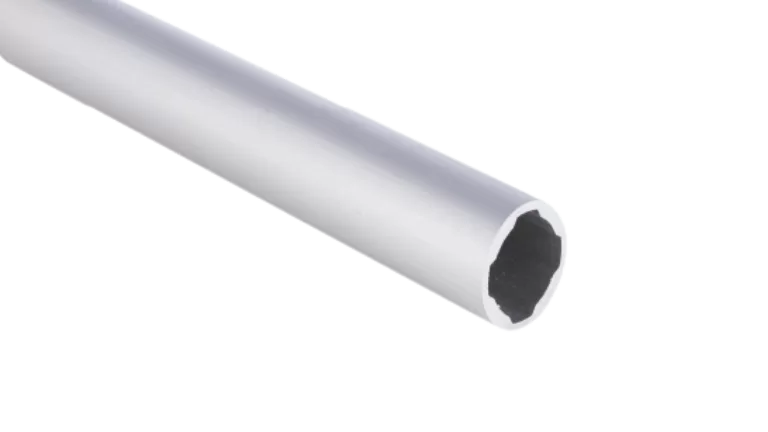
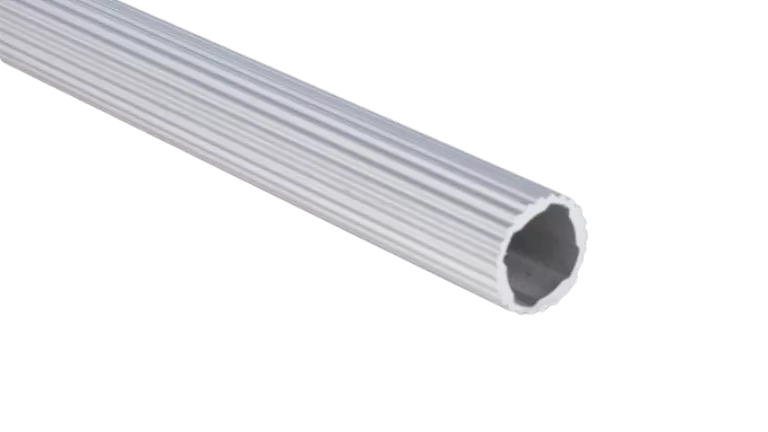
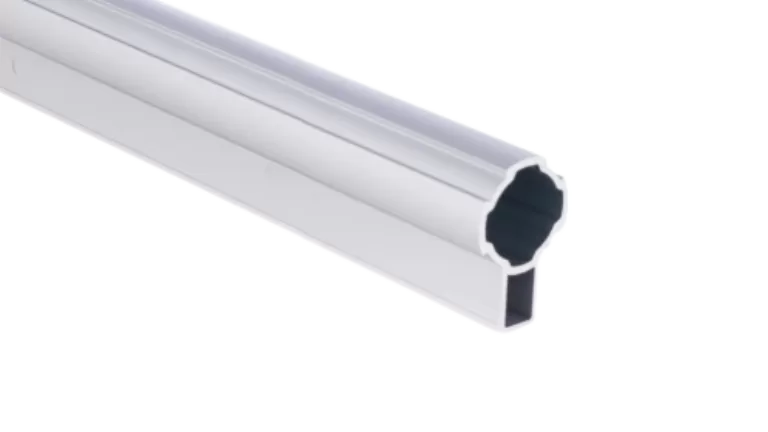
Aluminum Lean Pipe Specifications
| Item | Specification |
|---|---|
| Material | Aluminum alloy (6061/6063) |
| Outer Diameter | 19mm, 28mm, 43mm |
| Wall Thickness | 1.2mm, 1.7mm |
| Length | 4 meters per piece |
| Color | Natural color, Anodized color |
| Load Capacity | Depends on diameter and thickness |
| Surface Treatment | Oxidized sandblasting, Anodizing |
| Anodized Film Thickness | 10-25 micrometers |
| Application Area | Industrial equipment, Furniture, Display racks |
Connection Methods for Aluminum Lean Pipes
Lean pipes can be quickly and easily assembled into aluminum framing using connectors. These connectors enable various joint configurations, including straight joints, 90-degree, 45-degree, and 135-degree angles, as well as connections at any angle. Additionally, three pipes can be joined together to form perpendicular intersections. This versatility allows for flexible designs that can be rapidly adapted to meet a wide range of structural needs.
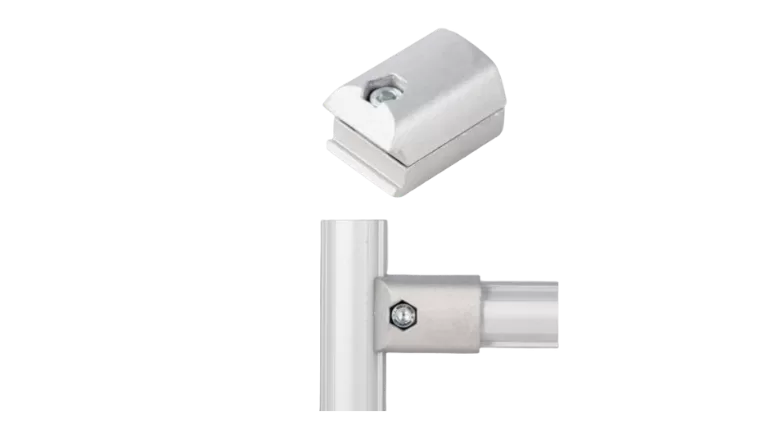
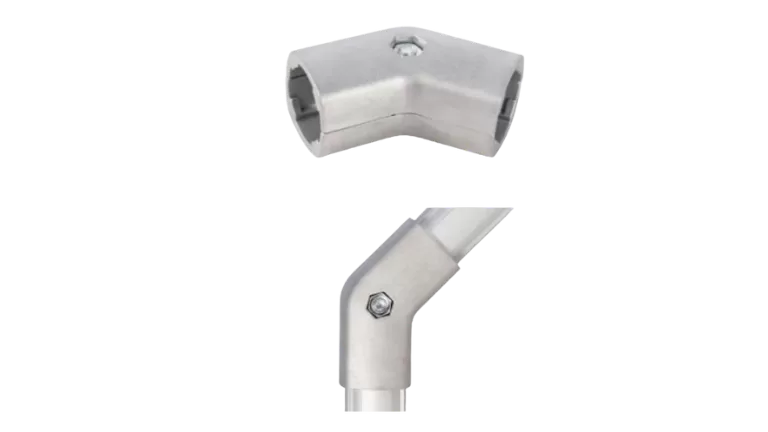
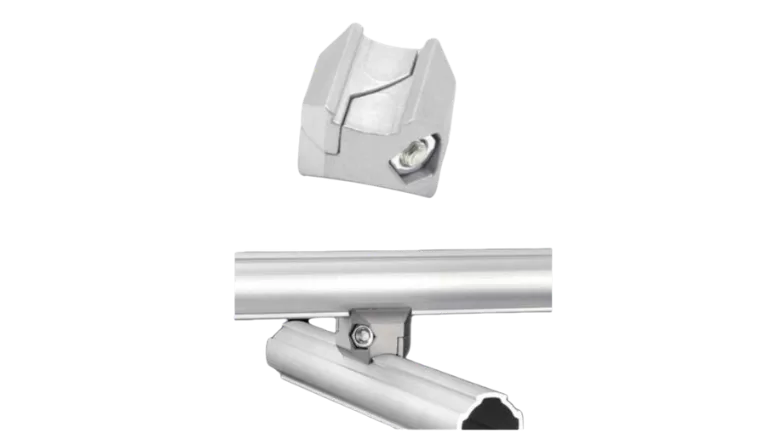
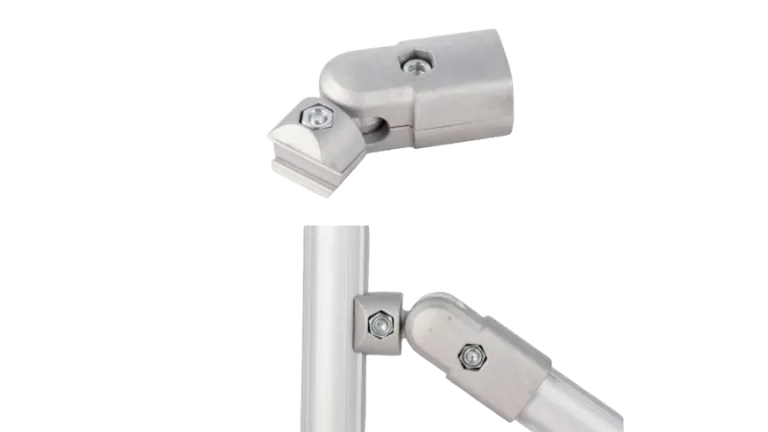
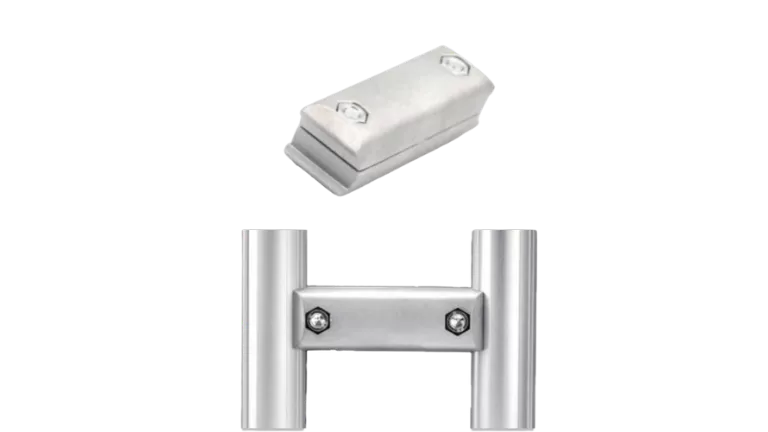
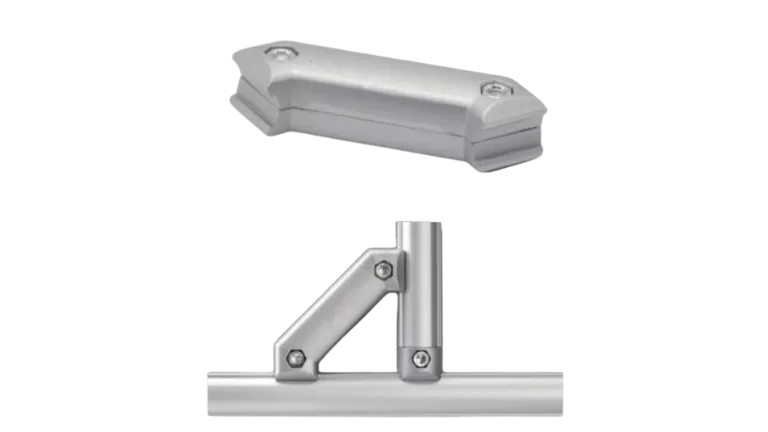
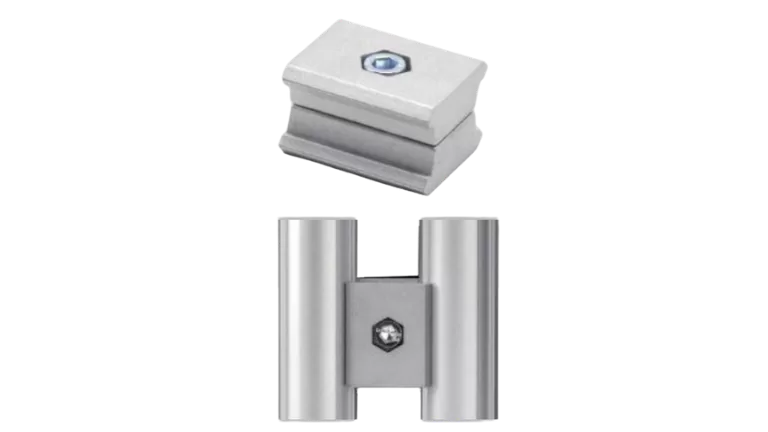
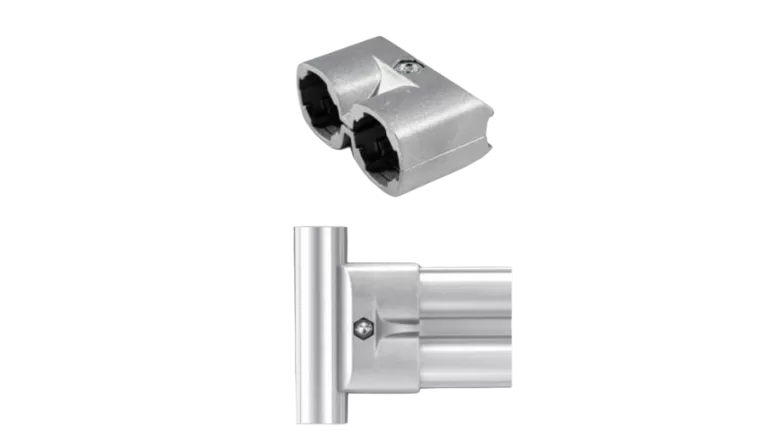
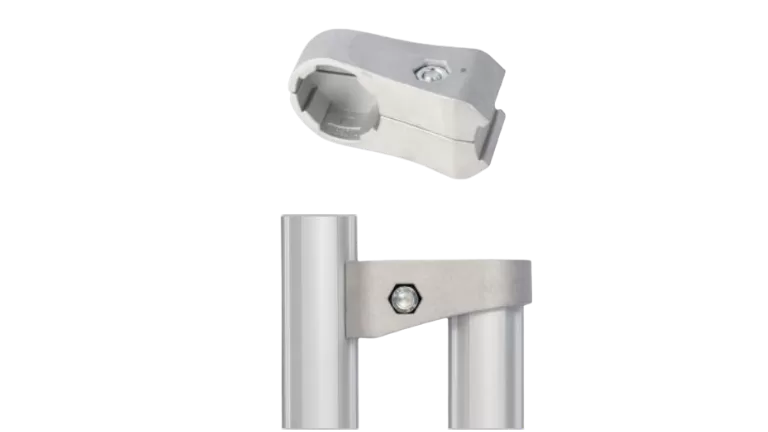
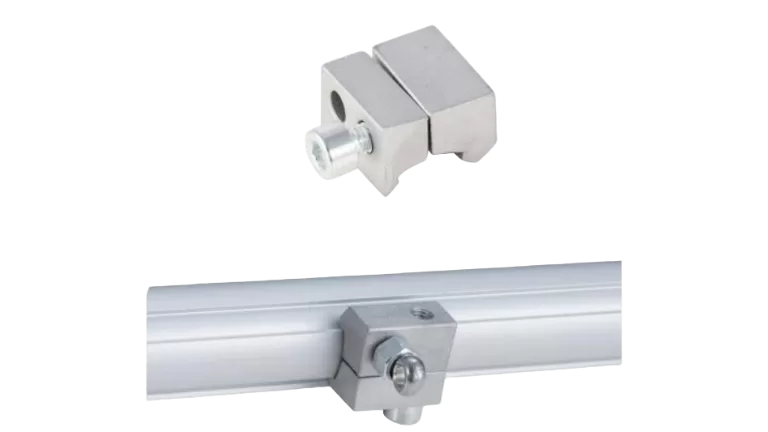
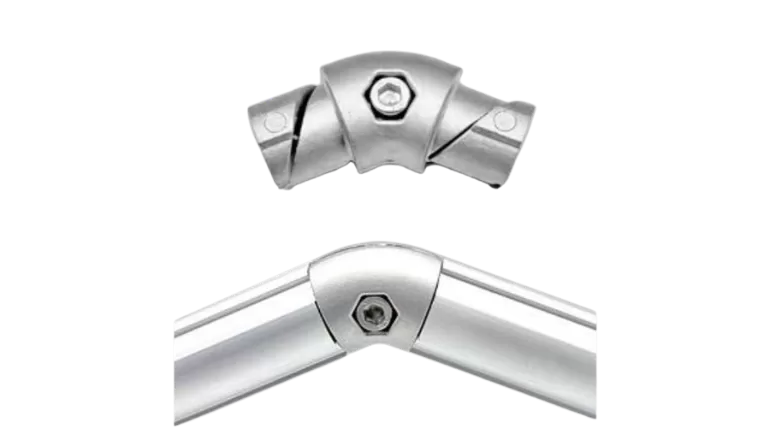
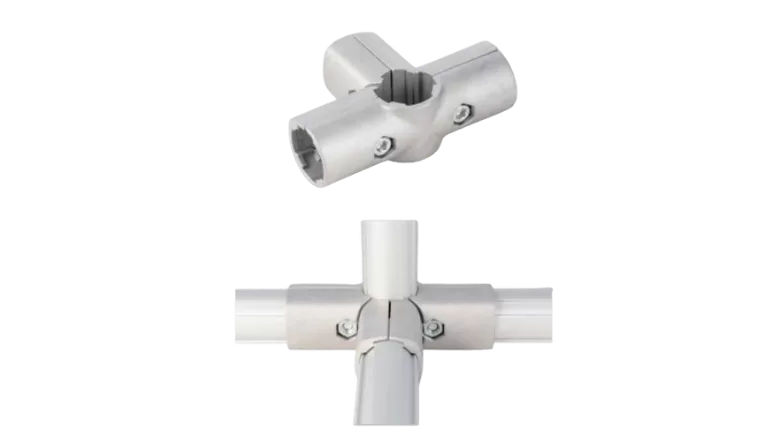
Aluminum Lean Pipe Solution by HTS-ALU
HTS New Materials is a leading aluminum extrusion manufacturer in Jiangxi Province, China, with an annual capacity of 6000 tons and over 40 advanced production lines. We produce a wide range of aluminum profiles suitable for both construction and industrial applications, including specialized thermal break aluminum profiles.
Our services include surface treatments such as anodizing and powder coating, as well as CNC machining and assembly for fully customized solutions. We are committed to quality and innovation, delivering high-quality products and services to global customers with fast delivery times to efficiently meet their needs.
The Raw Materials for Aluminum Lean Pipes
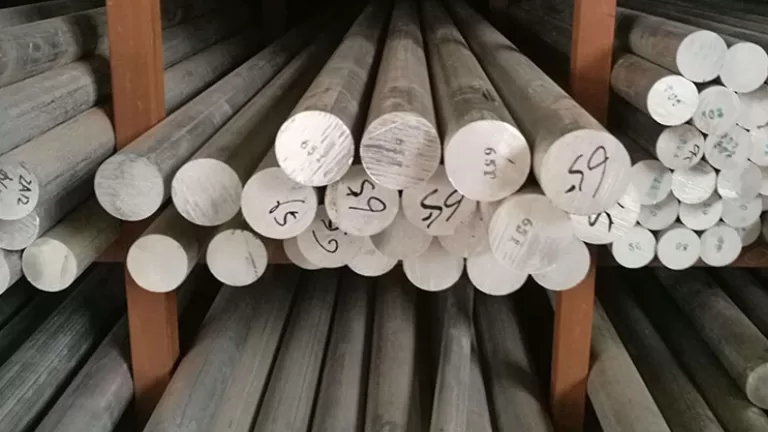
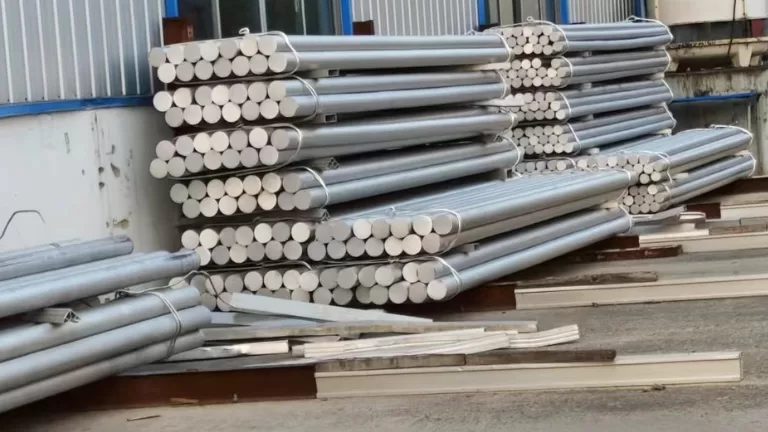
6063 aluminum alloy primarily consists of aluminum (97.5% to 98.5%) alloyed with magnesium (0.45% to 0.9%) and silicon (0.2% to 0.6%). T6 designation indicates that the alloy has undergone a heat treatment process that enhances its strength through aging.
Aluminum Lean Pipes Process
We provide customized aluminum lean pipe solutions using advanced technology and high-quality materials to enhance your production efficiency! Here are the main features of our process:
1. Customized Mold Design and Manufacturing: The production process of aluminum lean pipes begins with designing molds based on the client’s drawings or samples. Engineers create 3D models using CAD software, and then manufacture the molds using materials like steel or aluminum through CNC machining. Once prototypes are completed, samples are sent to the client for confirmation.
2. Professional Aluminum Extrusion: HTS-ALU utilizes advanced aluminum extrusion equipment. The aluminum billets are heated to temperatures between 400-500 degrees Celsius to achieve plasticity. Then, the heated aluminum billets are subjected to high pressure in the extrusion machine, shaped through custom-designed molds to form the desired profile of the lean aluminum pipe. After extrusion, the pipes undergo T5 or T6 heat treatment to enhance their strength and corrosion resistance.
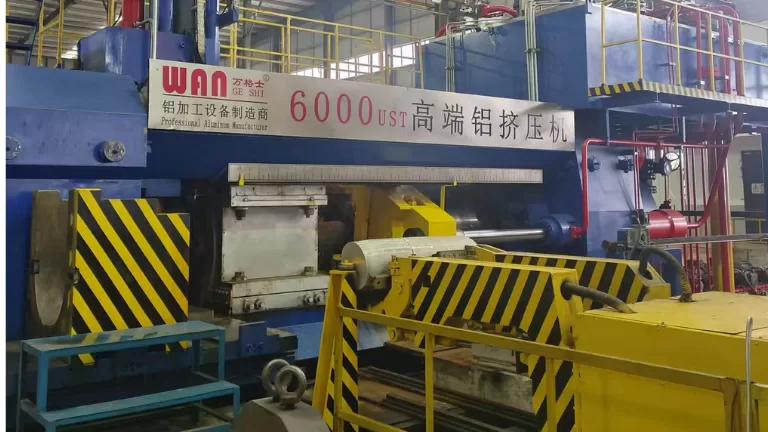
3. Surface treatment: The surface treatment of aluminum lean pipes typically involves silver anodizing, which enhances corrosion resistance and aesthetics. Additionally, the surface can be customized to include sandblasted silver anodizing based on client specifications. The anodized layer can achieve a thickness of up to 25 micrometers through a thermal oxidation process, providing durability and a high-quality finish that meets various application requirements. Other surface treatments can also be performed according to customer requests.
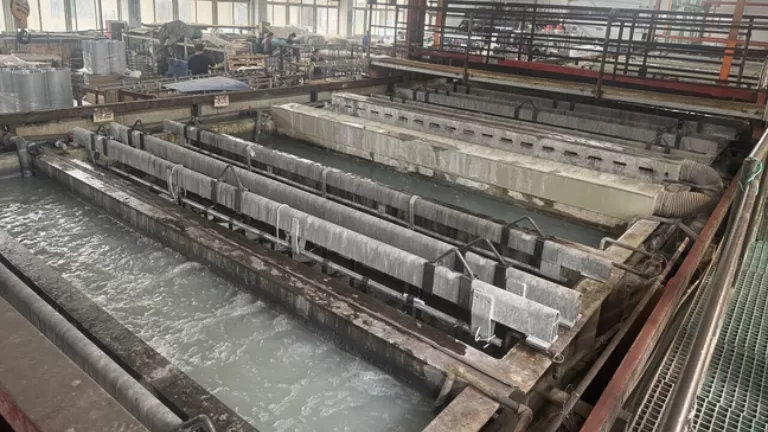
4. High-Quality Precision Machining:We carry out various operations based on the specific requirements of our customers, including drilling, milling, and cutting. During this process, we utilize advanced CNC equipment and precision tools to ensure the accuracy and quality of the machining.
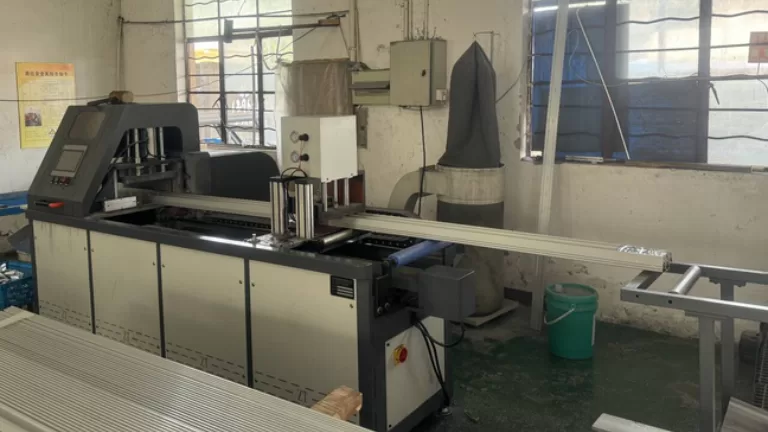
Practical Applications of Modular Lean Pipes
Aluminum lean pipes, as a specialized type of aluminum pipe, are commonly used in a wide range of practical applications across various industries, including:
Industrial Production Lines: Used to create automated production lines and workstations, improving production efficiency.
Warehousing Systems: Employed as part of shelving and storage solutions, facilitating item classification and storage.
Transportation Equipment: Utilized to build lightweight transportation and mobile equipment, such as workbenches and carts, for convenient material handling.
Assembly Lines: Provide stable work platforms for operators, supporting them during the assembly process.
Machine Frames: Used to construct the frames of machines and equipment, offering excellent strength and adjustability.
Environmental Products: Due to the recyclability of aluminum, lean tubes are also applied in sustainable development projects.
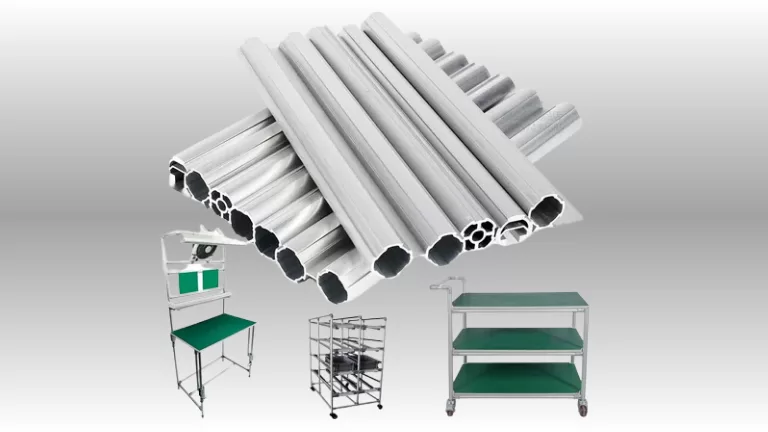
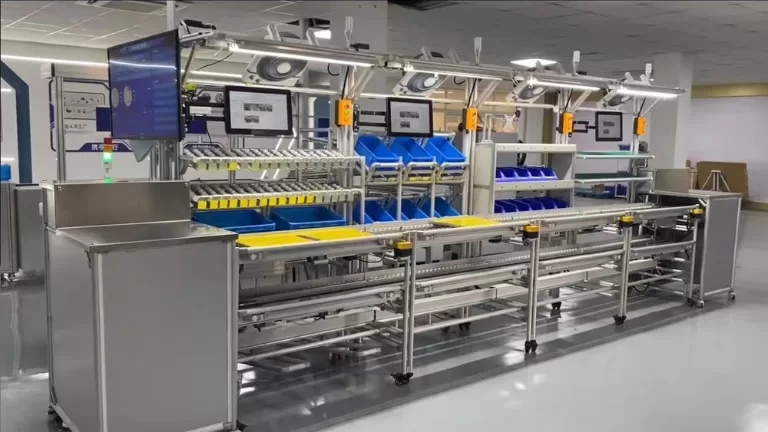
Key Features of Aluminum Lean Pipes
1. Multi-Material Structure
Usually made from a combination of aluminum alloy and high-performance polymers, combining the strength of metal with the lightweight characteristics of plastic.
Offers enhanced impact resistance and higher bending strength to suit diverse application demands.
2.Modular Design
Fully compatible with various connectors, fasteners, and fittings for flexible framework building.
Perfect for quick assembly and convenient disassembly, allowing on-demand adjustments.
3.Lightweight Advantage
Lighter than traditional metal lean pipes for easier transportation, handling, and installation.
Significantly reduces the overall weight of structures, improving operational efficiency.
4.Corrosion Resistance & Environmental Friendliness
Rust-proof and highly resistant to corrosion, well-suited for harsh or humid environments.
Fully recyclable, promoting green and sustainable manufacturing practices.
5.High Load-Bearing Capacity
Despite being lightweight, they can support heavy loads and meet the demands of high-intensity operations.
6.Aesthetic & Versatile Design
Smooth surface with customizable colors and finishes (e.g., anodized, powder-coated).
Enhances the professional appearance of factories, workshops, and warehouses.
Grooved Lean Pipes VS Traditional Pipe Systems
Grooved Lean Pipes, also known as Third-Generation Lean Pipes, represent an innovative approach to piping systems designed for enhanced flexibility and efficiency in modern manufacturing environments. These pipes utilize a unique grooved connection system that allows for easy assembly, disassembly, and reconfiguration as production needs change.
| Features | Third-Generation Lean Pipes | Traditional Piping Systems |
|---|---|---|
| Flexibility | Highly flexible and easy to reconfigure | Difficult to modify, requires redesign |
| Installation Time | Quick installation and commissioning | Time-consuming and complex installation |
| Material Utilization | High-strength, lightweight materials reduce waste | Conventional materials are heavier and more complex |
| Function Integration | Multiple functional options without additional construction | Functions are independent, requiring extra components or tools |
| Adaptability | Adapts to changing production needs | Fixed design with limited adaptability |
| Cost Efficiency | Long-term savings on labor and material costs | Higher initial costs with significant long-term maintenance expenses |
Our Factory
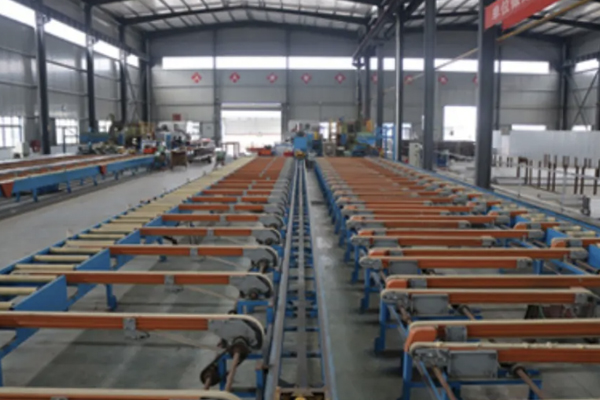
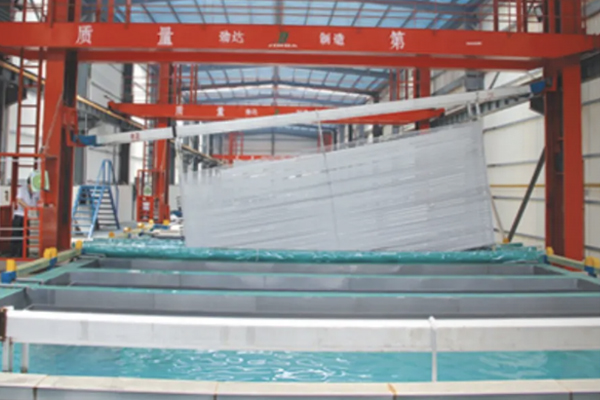
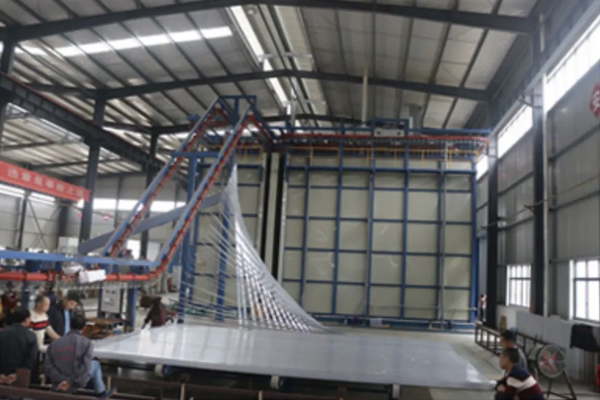
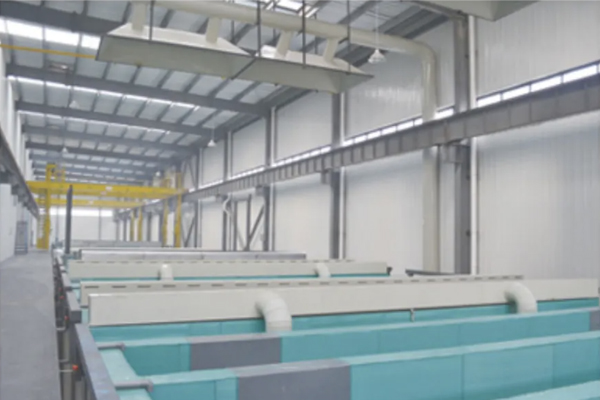
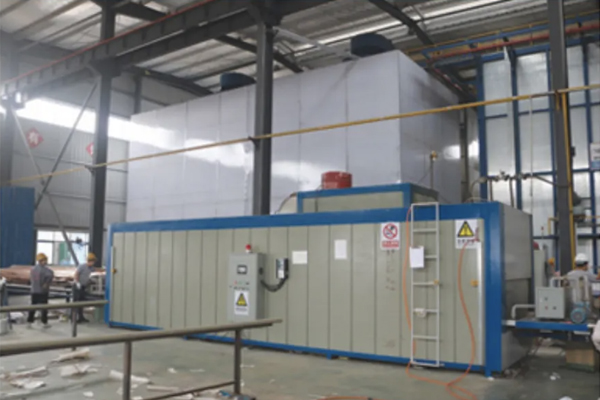
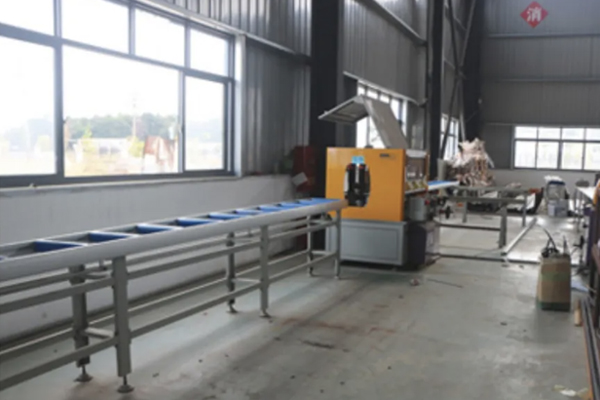
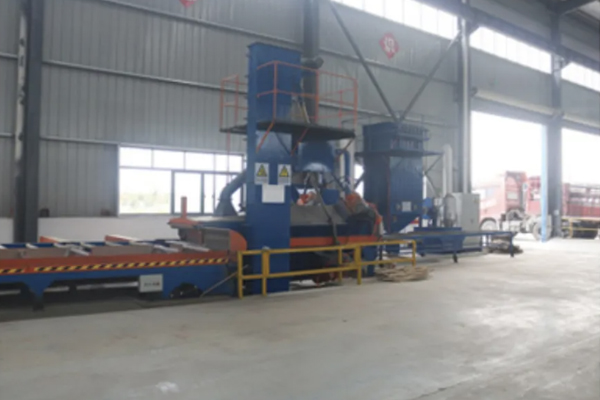
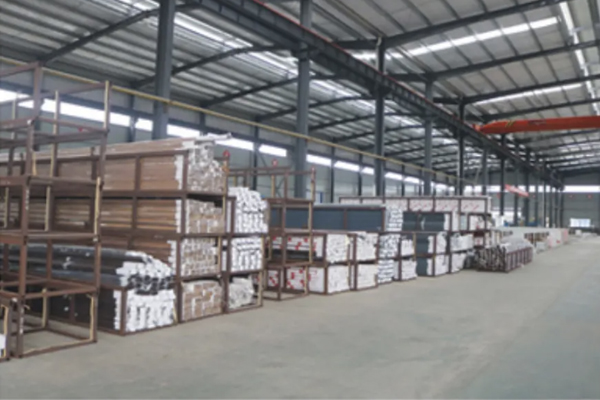
RFQ of Extruded Aluminum Profile
Aluminum Alloy 6061
- Characteristics:
- Excellent mechanical properties
- Good corrosion resistance
- Medium to high strength
- Weldable
- Benefits: Versatile and widely used in structural applications, offering good fatigue resistance and ease of fabrication.
- Characteristics:
Aluminum Alloy 6063
- Characteristics:
- Good corrosion resistance
- Excellent extrudability and finishing
- Lower strength compared to 6061
- Benefits: Ideal for architectural applications and situations requiring aesthetic appeal, such as window frames and custom shapes.
- Characteristics:
Aluminum Alloy 6082
- Characteristics:
- High strength and good corrosion resistance
- Good weldability
- Excellent machinability
- Benefits: Suitable for heavy-duty applications, including structural components in buildings and bridges.
- Characteristics:
Aluminum Alloy 5052
- Characteristics:
- Good corrosion resistance, especially in marine environments
- Excellent workability and weldability
- Moderate strength
- Benefits: Commonly used in applications where the material may be exposed to harsh conditions, such as fuel tanks and pressure vessels.
- Characteristics:
Aluminum Alloy 5005
- Characteristics:
- Good corrosion resistance
- Excellent anodizing properties
- Moderate strength
- Benefits: Often used for decorative applications and architectural features due to its surface finishing capabilities.
- Characteristics:
Aluminum Alloy 2024
- Characteristics:
- High strength-to-weight ratio
- Good fatigue resistance
- Less corrosion resistant compared to other alloys
- Benefits: Frequently used in aerospace applications and other high-stress environments, where strength is critical.
- Characteristics:
Aluminum Alloy 7075
- Characteristics:
- Very high strength
- Lower corrosion resistance
- Heat-treatable
- Benefits: Ideal for aerospace and military applications, where maximum strength is required.
- Characteristics:
The heat treatment of aluminum extrusions determines their mechanical properties, strength, and suitability for specific applications. Among the various heat treatment methods, T5, T6, and T66 are the most commonly used. Here’s an in-depth look:
| Heat Treatment State | Cooling Method | Strength | Key Features and Benefits | Applications |
|---|---|---|---|---|
| T5 | Air cooling (fan) | Moderate | Adequate strength, good dimensional stability, used for architectural purposes. | Windows, doors, curtain walls, building structures. |
| T6 | Water quenching (fast) | High | Higher strength and hardness, ideal for industrial and structural uses. | Automotive, aerospace, machinery, transport parts. |
| T66 | Water quenching (fast) | Very high | Optimized mechanical properties for higher strength and performance demands. | Automotive, rail transportation, high-end machinery. |
Other Heat Treatment States
- T4: Solution heat-treated and naturally aged. Used in applications requiring intermediate strength and enhanced formability.
- T7: Overaged for better stress-corrosion resistance, often used for aerospace and marine purposes.
- O (Annealed): Very soft condition suitable for extensive forming or bending requirements.
- F (As-Fabricated): No heat treatment applied, used in non-critical applications with low strength requirements.
Anodizing
- Description: Anodizing is an electrochemical process that thickens the natural oxide layer on aluminum surfaces.
- Benefits:
- Enhances corrosion resistance.
- Improves surface hardness and abrasion resistance.
- Can be dyed in various colors for aesthetic purposes.
- Environmentally friendly, as it does not require toxic chemicals.
Powder Coating
- Description: A process where a dry powder is applied to the aluminum surface and then cured under heat to form a durable finish.
- Benefits:
- Provides a thick, protective layer resistant to chipping, scratching, and fading.
- Available in a wide range of colors and textures.
- Offers excellent UV resistance and is suitable for outdoor applications.
Sandblasting
- Description: A mechanical process that involves blasting the surface with abrasive material to create a textured finish.
- Benefits:
- Prepares the surface for better adhesion of paints or coatings.
- Can improve the aesthetic appearance for certain applications.
- Provides a uniform, matte finish that reduces glare.
We provide a wide range of machining services for aluminum extrusions to meet specific requirements. These include cutting off/section removal, slotting, drilling holes, tapping threads, bending, and localized stamping to create deformations. For example, we can trim extruded profiles to custom lengths, mill precise grooves, create threaded holes for fasteners, bend profiles into specific shapes, or apply localized stamping to achieve custom forms or deformation.
In addition to these processes, we also offer TIG/MIG welding to join aluminum components for a solid structure. Furthermore, our services include assembly of common accessories, such as brackets, corner connectors, screws, hinges, end caps, and rubber seals, providing complete and ready-to-install profile solutions tailored to your project needs. This ensures that we can handle everything from simple cuts to highly customized fabrication and assembly, all with precision and efficiency.
For custom aluminum extrusion projects, we accept a variety of drawing formats, including CAD files, STEP files, and PDF files. However, for extrusions that require additional machining processes, it’s recommended to provide STEP files, as they ensure precise 3D modeling for machining accuracy.
While PDF files are acceptable, converting them into CAD drawings may result in the loss of certain details, requiring us to manually redraw the design, which could increase lead time. For the fastest and most accurate quotation, we recommend providing CAD files (e.g., DWG/DXF) and STEP files to ensure efficient design evaluation and pricing.
There are clear differences between aluminum lean pipes and steel pipes in terms of material, production process, cost, and uses.
1. Material and Production:
Aluminum Lean Pipes: Made from aluminum alloys and treated with processes like sandblasting and anodizing to resist corrosion and rust. They have a smooth surface, are highly resistant to corrosion, and last a long time.
Steel Pipes: These can be made from different types of steel, including carbon and alloy steels, and can be produced as seamless or welded pipes. While there are many types of steel pipes, they generally have rougher surfaces and are less resistant to corrosion compared to aluminum lean pipes.
2. Cost:
Aluminum Lean Pipes: Produced on automated lines, which keeps costs low. They can also be reused, which further saves money, especially when produced in large quantities.
Steel Pipes: Typically, they are more expensive to produce, especially seamless pipes and those made from special materials.
3. Uses:
Aluminum Lean Pipes: Commonly used in industries like home appliances, communications, automotive, and machinery manufacturing. Their lightweight, efficiency, and eco-friendly nature make them a popular choice in modern construction instead of traditional steel pipes.
Steel Pipes: Used in a wide range of areas, including transport pipelines, construction, thermal equipment, and petrochemical industries. Although they are widely used, they may not be as suitable in situations that require lightweight and efficient materials.
Mold fees are an essential part of the custom aluminum extrusion process. Since every order requires a uniquely designed mold tailored to specific requirements, these molds cannot be used for other products. Therefore, the mold fee is necessary and non-negotiable.
We require 100% upfront payment of the mold fee before mold development begins to ensure timely production. However, as a token of appreciation for your support, we offer a refund of the mold fee or equivalent discounts once the order reaches a certain production volume. Specific policies can be discussed based on your order volume and collaboration details.
We have a large stock of lean pipes available and do not have a minimum order quantity (MOQ) requirement. You can order any quantity you need, as long as you are willing to cover the shipping costs from China. For specific details, please contact our sales team.
For custom production, minimum order quantity (MOQ) varies depending on the size of the product. For smaller-sized products, the MOQ is typically 500kg, while for larger-sized products, it is 2 tons.
We will specify the exact MOQ requirements during the quotation process. If your order quantity does not meet the MOQ, we can still arrange production, but an additional fee will be applied to cover mold preheating and production setup time. Rest assured, this extra fee will be reasonable, and we aim to keep it as minimal as possible to ensure smooth cooperation.
Our lean pipes are typically packaged in lengths of 4 meters per pipe, with 10 pipes per bundle. However, we also offer custom packaging options to meet specific customer requirements. If you have particular preferences regarding length or quantity, please let us know, and we will do our best to accommodate your needs.
When purchasing from our stock, there is no waiting period, and we can ship within 7 days of payment. Mold production typically takes 7 days. After the sample is confirmed, producing a full container load of 26 tons generally requires 14 days for extrusion alone. If surface treatment is required, an additional 3 days will be needed. For machining, extra time will be required depending on the complexity and volume of the machining work. The exact additional time for machining will be determined based on the specific processing requirements.
Aluminum profiles are naturally corrosion-resistant due to the formation of a thin, protective oxide layer when exposed to air or water. This oxide layer is stable and self-repairing, meaning that even if the surface is scratched or cut (such as at exposed ends or during processing), the aluminum will not rust or corrode like iron or steel. Instead, the exposed areas will quickly form a new oxide layer, providing continuous protection against further oxidation.
With proper design, installation, and maintenance, aluminum profiles can last for decades, even in challenging environments. For example, untreated aluminum can easily withstand 20-30 years in outdoor applications, while profiles with surface treatments like anodizing or powder coating can last even longer, often exceeding 50 years. This makes aluminum an excellent choice for applications where durability and long-term performance are essential.
The price of aluminum profiles consists of several components: raw material costs, extrusion processing fees, surface treatment fees, machining costs, and additional packaging fees. Among these, the cost of aluminum as a raw material tends to fluctuate frequently, while other fees remain relatively stable. Due to these fluctuations, our quotations are typically valid for 7 days.
Pricing can be structured in different ways depending on the product and requirements. It can be calculated by weight (e.g., cost per ton), by length (e.g., cost per meter), or by piece (e.g., cost per unit). For products involving extensive machining, such as heat sinks, pricing is generally calculated on a per-piece basis to accurately reflect the additional processing costs. This flexible pricing approach ensures the quote is tailored to the specific needs of the customer.
We can manufacture aluminum profiles in compliance with technical requirements that meet European standards (EN), American standards (ASTM/AA), or other standards as specified by the customer. Custom production is tailored to ensure that the profiles meet the specific standard requirements requested.
Our production equipment is designed for the metric system. If the drawings provided are in the imperial system, we will convert them into metric units for production to ensure accuracy.
It is important to note that while we can machine imperial-threaded holes for fasteners, if you require us to supply matching imperial fasteners, they may not always be available in stock. Custom orders for imperial fasteners typically require a large volume for production. Please consider this when planning your project.
